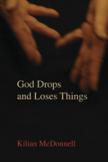'How Long, O Lord?'
The titles of Kilian McDonnell’s two earlier collections of poetry, Swift, Lord, You Are Not and Yahweh’s Other Shoe, confirm what the latest might suggest: the author has fun with words. One wonders what “God drops” might be. As the conclusion of a trilogy, of course, the title suggests that this is the other shoe we have been warned about. As such, McDonnell moves relentlessly through the Bible and on to his own daily life in the monastery, and finally to old age and a stark confrontation with mortality, as his fellow monks drop (but not from God’s hands) like flies (or old shoes), and he echoes the psalmist’s lament: “How long, O Lord?”
But first there is the “losing” to endure. McDonnell has a knack of taking Yahweh to task by inhabiting the personalities described in the Old Testament, the cynical complainers who kvetch about their devotion to the one true God. Arguing the nature/nurture controversy, a skeptical spokesperson from Deuteronomy puts respect aside and asks the rhetorical question, “Who parked Your well-greased/ chariot of war in my oafish/ genes?” The relationship between Sarah and Abraham, with a little Hagar thrown in, gets the monk’s attention, resulting in pithy proverbs that are culled through gritted teeth. Then there’s Isaac, rarely heard from as he lies on the altar about to have his blood shed. He asks the question theologians suggest we are all meant to ask: “what kind/ of deity is this who asks this horror/ whose will lies in the absurd/ and in the abyss beyond?” Such is the conclusion of the first third of the book: “I do not speak of antiseptic rectitude/ but fire’s absolute autonomy that scolds me/ for putting dirty sandals on glowing cinders/ but invites me to approach barefoot.”
As the poems move into the New Testament, the complaints are less angry, but the hope more tenuous. John the Baptist, sitting in prison, asserts that “Whatever else/ I doubt, him I do not”; nonetheless he acknowledges that “God speaks to me/ no more. …[and] all I hear/ are camels grunting outside/ my window and the music fading.” The faith that is demanded in such silence echoes in the subtle refusal of Jesus to consider marriage in place of a mission: “Jesus shakes his head, runs his hand along his cedar plank/ feeling its smooth grain.” At the last supper, the disciples face a stark choice: “When they look down/ no solid ground beneath them/ except my hand upon the table.”
Confrontations with the inexplicable are frequent throughout the poems—surely they are there in the accounts from the early books of the Bible, but equally in the more directly personal encounters with the deaths of McDonnell’s friends. As evocative as the personae of the biblical poems are, these later poems about a man facing his oncoming death are more immediately gripping and sincere. The exhaustion of old age is compared to Odysseus’ dog, “who alone/ can recognize his master in disguise/ when he returns to Ithaca after twenty years./ The mutt, too weak to raise his head, too old to wag his tail, dies of joy.” A similar note is struck with the rueful observation that “at eighty-seven/ I guard my ralentando/ days, but they go.” There is an echo of John in prison, but a clear sense of waiting, of expectation: “So I sit beneath/ the maple with a blister on its trunk/ branches broken by a storm./ Someday I’ll be found.” The poet echoes Abraham Heschel and Francis Thompson, awaiting the hound who is seeking him. And, like John Donne, he concludes, “Where death, there God.”
It is no surprise that a late poem suggests the poet draws inspiration from Seamus Heaney, Emily Dickinson and Robert Hass. They would welcome him as a brother on the road.
This article also appeared in print, under the headline “'How Long, O Lord?',” in the August 17, 2009, issue.








